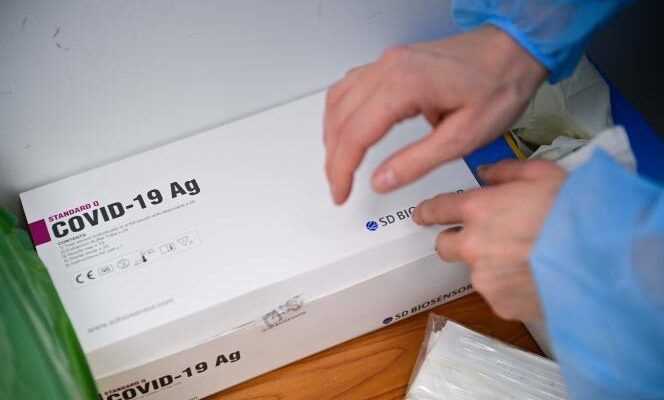Announced in July by Emmanuel Macron, the measure was confirmed last week by Prime Minister Jean Castex: from October 15, Covid-19 screening tests will no longer be reimbursed except for medical reasons or for people vaccinated . Their cost is now known, according to information obtained by The world with the Ministry of Health, Thursday October 7:
- 43.89 euros for a PCR test;
- 22 euros for an antigenic test in the laboratory, 25 euros in pharmacies (30 euros on Sundays).
Tests will continue to be reimbursed for medical reasons, either without prescription for people already vaccinated, or on prescription for others. Free admission should also be maintained for minors.
Initially announced to encourage vaccination, this decision also responds to economic considerations: “It is no longer legitimate to pay excessively for comfort tests at the expense of taxpayers”, justified Jean Castex. Until now, France was one of the few countries in the world not to require symptoms or to be in contact to fully reimburse PCR tests. A policy that has a cost: 6.2 billion euros this year.
Since the beginning of July, except for medical reasons, the tests had already become paying for foreign tourists coming to France: they must now pay 43.89 euros for a PCR test, 25 euros for an antigen test. “The logic is to reimburse the tests linked to genuinely medical reasons, and to continue to encourage people to be vaccinated”, insisted the Prime Minister.
While nearly three quarters of the population is fully vaccinated, there are potentially 6 million adults to be convinced. However, charging the unvaccinated for tests could encourage them to take the plunge if they want to benefit from the health pass in force.
The flip side is that there will be “Probably fewer positive people who will be tested”, warned epidemiologist Pascal Crépey. With a risk of a rebound in the epidemic linked to the arrival of autumn, it is not certain that this policy is “Tenable”, he believes.
A “double-edged sword” decision
According to ministry data, the number of tests performed has been falling every week since a peak in mid-August, dropping from 5.7 million tests on that date to 3.5 million the week of September 27.
With the announced delisting, some fear inequality in access to care: “Only those who can afford it will continue to test themselves”, warns infectious disease specialist Gilles Pialoux. “Until October 15, the prospect of this delisting will perhaps act as a slight incentive for vaccination, Judge Mahmoud Zureik, professor of epidemiology at the University of Versailles – Saint-Quentin-en-Yvelines. But then, differentiated access to care between vaccinated and non-vaccinated may promote the spread of the virus. It is a double-edged sword. “
If the epidemiologist considers it normal that “The comfort tests are no longer reimbursed, because we were in excess and there was abuse”, restricting their access carries risks, he said. “We will no longer be able to correctly follow the evolution of the epidemic because the incidence rate, one of the earliest indicators, will be affected, he advances. [Mais] the major risk is that the need to have a medical prescription dissuades people who have symptoms or who are in contact with them from going for testing. Moreover, the time to obtain a prescription gives the virus time to spread. “
For others, it is the whole testing policy that needs to be reviewed from top to bottom: “We wasted an incredible amount of money on tests while letting the virus circulate because there was no strategy for these tests”, deplores the epidemiologist Catherine Hill. According to her, it has never been possible to trace all the cases of Covid-19. ” [Depuis le début de l’épidémie], we have always tested no matter how “, she laments. To change the situation, she recommends “Do group tests: for example in all classes in France twice a week”.
